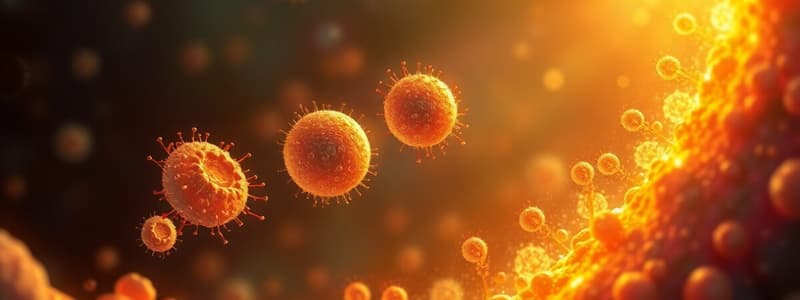Podcast
Questions and Answers
What is the main process by which one cell becomes two?
What is the main process by which one cell becomes two?
- Fragmentation
- Binary Fission (correct)
- Budding
- Mitosis
Which phase of the growth curve indicates that newly inoculated cells are adjusting and not yet multiplying rapidly?
Which phase of the growth curve indicates that newly inoculated cells are adjusting and not yet multiplying rapidly?
- Stationary phase
- Lag phase (correct)
- Death phase
- Exponential phase
During which phase of the growth curve does bacterial population increase geometrically?
During which phase of the growth curve does bacterial population increase geometrically?
- Death phase
- Exponential growth phase (correct)
- Stationary phase
- Lag phase
What method can be used to electronically count cells passing through a pipette?
What method can be used to electronically count cells passing through a pipette?
What happens during the Death phase of bacterial growth?
What happens during the Death phase of bacterial growth?
Flashcards
Binary Fission
Binary Fission
A method of asexual reproduction where one cell divides into two identical daughter cells.
Generation Time
Generation Time
The time it takes for a bacterial cell to completely divide into two daughter cells.
Lag Phase
Lag Phase
The initial phase in a bacterial growth curve where cells are adjusting to the new environment and not yet multiplying at a maximum rate.
Exponential Growth Phase
Exponential Growth Phase
Signup and view all the flashcards
Direct Cell Count
Direct Cell Count
Signup and view all the flashcards
Study Notes
Chapter 7 Notes
- Binary fission: one cell divides into two
- Generation time (doubling time): time for one cell to divide into two
- Generation: population increases by a factor of two
Growth Curve
- Predictable population growth pattern in a closed system
- Lag phase: initial "flat" period; newly inoculated cells adjust, enlarge, and synthesize
- Exponential (log) phase: rapid growth; cells multiply at maximum rate; growth increases geometrically
- Stationary phase: growth rate slows down, nutrients become limited; environment becomes unfavorable
- Death phase: cells die at a faster rate than new cells are produced; environmental conditions become increasingly unfavorable
Measuring Microbial Growth
- Direct cell count: microscopic count
- Coulter counter: electronically counts cells as they pass through a small aperture
- Flow cytometer: a device that measures cell size & differentiates between live and dead cells; similar to Coulter counter
Studying That Suits You
Use AI to generate personalized quizzes and flashcards to suit your learning preferences.




